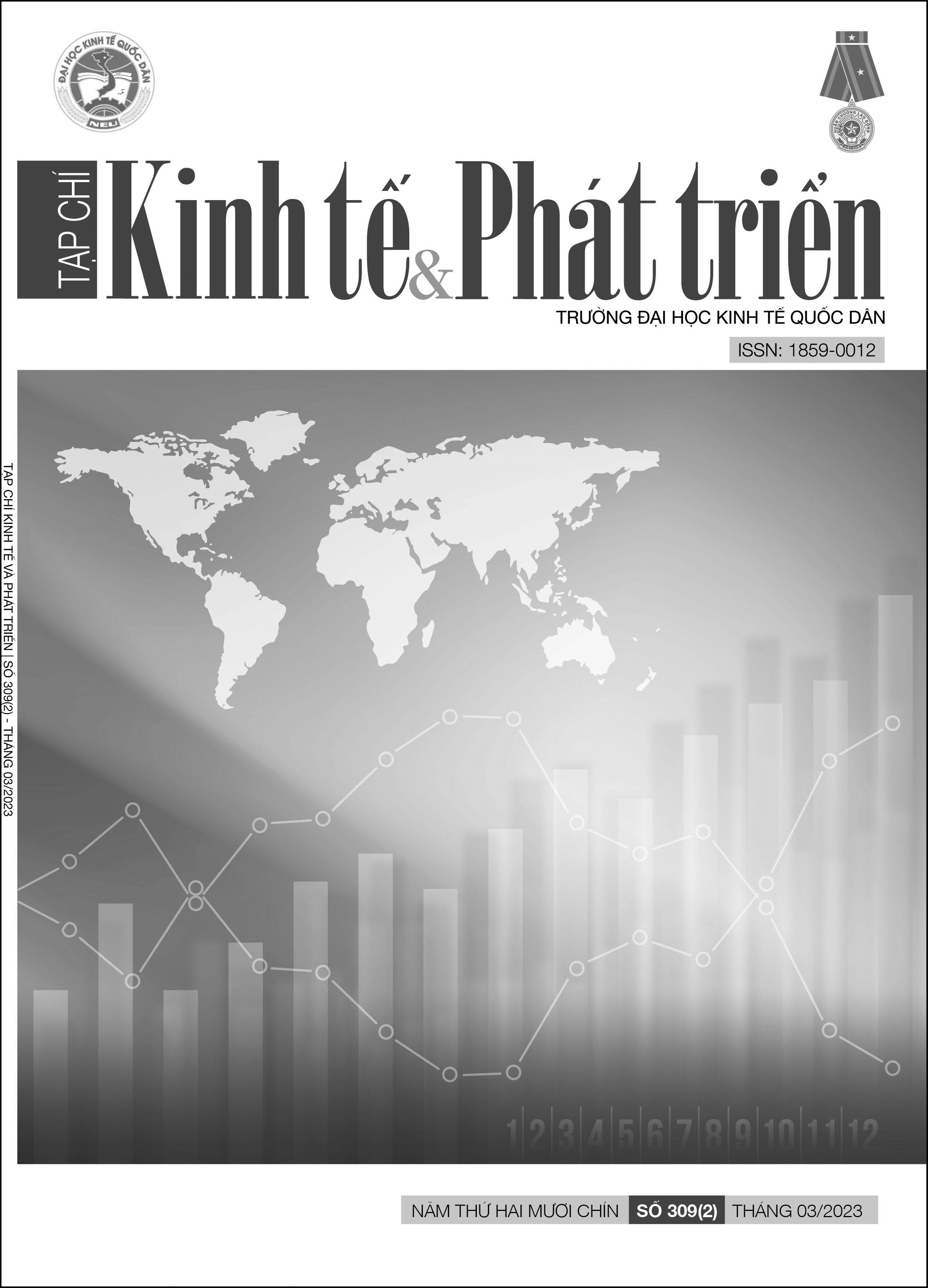Nhân tố tác động đến ý định tham gia kinh tế chia sẻ của người dùng Airbnb ở Hà Nội nhìn từ lý thuyết tương tác xã hội (SET)
DOI:
https://doi.org/10.33301/JED.VI.196Từ khóa:
Kinh tế chia sẻ, Airbnb, lý thuyết tương tác xã hộiTóm tắt
Nghiên cứu nhằm kiểm định mối quan hệ của các nhân tố tác động đến ý định tham gia kinh tế chia sẻ của những người dùng Airbnb ở Hà Nội từ góc nhìn của lý thuyết tương tác xã hội (SET). Kết quả nghiên cứu cho thấy trong 5 nhân tố “sự hấp dẫn”. “lợi ích kinh tế”, “hiệu ứng mạng lưới”, sự bền vững” và “mối quan hệ xã hôi” thì “sự hấp dẫn” có tác động tích cực đến “thái độ” của người dùng và “thái độ” cũng có tác động tích cực đến “ý định” tham gia của họ với Airbnb. Kết quả nghiên cứu đã cung cấp bằng chứng thực nghiệm để chỉ ra rằng lý thuyết SET có áp dụng khác nhau cho những bối cảnh kinh tế xã hội khác nhau. Bài viết đề xuất các giải pháp làm tăng độ hấp dẫn của các nền tảng kinh tế chia sẻ và các giải pháp về cơ chế chính sách nhằm quản lý và thúc đẩy phát triển đúng hướng nền kinh tế chia sẻ ở Việt Nam.
Tài liệu tham khảo
Ajzen, I. & Fishbein, M. (1980), Understanding attitudes and predicting social behavior, Englewood Cliffs, NJ: Prentice-Hall, Englewood Cliffs, NJ, USA.
Bardhi, F. & Eckhardt, G.M. (2012), ‘Access-based consumption: The case of car sharing’, The Journal of Consumer Research, 39(4), 881–898.
Boateng, H., Kosiba, J.P.B. & Okoe, A.F. (2019), ‘Determinants of consumers’ participation in the sharing economy: A social exchange perspective within an emerging economy context’, International Journal of Contemporary Hospitality Management, 31(2), 718-733.
Botsman, R. (2013), ‘The sharing economy lacks a shared definition’, Unparalelled Journalism, last retrieved on 21 November 2013, <https://www.fastcompany.com/3022028/the-sharing-economy-lacks-a-shared-definition>.
Botsman, R. & Capelin, L. (2016), Airbnb: Building a revolutionary travel company, Research report of Said Business School, University of Oxford.
Chính phủ (2018), Nghị quyết số 13/NQ-CP phiên họp Chính phủ thường kỳ tháng 01/2018 về việc xây dựng Đề án về mô hình kinh tế chia sẻ, ban hành ngày 08 tháng 2 năm 2018.
David, S.E. & Richard, S. (2008), ‘Markets with Two-Sided Platforms’, Issues in Competition Law and Policy, 1(28), 667-693.
Davis, F.D. (1989), ‘Perceived usefulness, perceived ease of use, and user acceptance of information technology’, MIS Quarterly, 13(3), 319–340.
Forno, F. & Garibaldi, R. (2015), ‘Sharing economy in travel and tourism: the case of home-swapping in Italy’, Journal of Quality Assurance in Hospitality and Tourism, 16(2), 202-220.
Hamari, J., Sjöklint, M. & Ukkonen, A. (2016), ‘The Sharing Economy: Why People Participate in Collaborative Consumption’, Journalis of the Association for Information Scientific and Technology, 67(9), 2047-2059.
Hamon, R.R. & Bull, K.S. (2016), “‘What do you have to offer me?” A relationship building activity for demonstrating social exchange theory’, Family Science Review, 21(1), 26-40.
Hars, A. & Ou, S. (2001), ‘Working for Free? Motivations of Participating
in Open Source Projects’, International Journal of Electronic Commerce, 6(3), 25-39.
Heinrichs, H. (2013), ‘Sharing Economy: A Potential New Pathway to Sustainability’, Gaia-ecological Perspectives for Science and Society, 22(4), 228-231.
Homans, G.C. (1950), The Human Group, Harcourt, Brace, New York.
Homans, G.C. (1958), ‘Social behavior as exchange’, American Journal of Sociology, 63(6), 597-606.
Homans, G.C. (1961), Human Behavior: Its Elementary Forms, Harcourt, Brace, New York.
Huang, H.C., Cheng, T.C.E., Huang, W.F. & Teng, C.I. (2018), ‘Impact of online gamers’ personality traits on interdependence, network convergence, and continuance intention: perspective of social exchange theory’, International Journal of Information Management, 38(1), 232-242.
Kim, J., Yoon, Y. & Zo, H. (2015), ‘Why people participate in the sharing economy: a social exchange perspective’, Proceedings of Pacific Asia Conference on Information Systems (PACIS), National University of Singapore, Singapore, 6-9.
Mai Lan (2018), ‘Thời kinh tế chia sẻ’, Nhân dân hàng tháng, truy cập lần cuối ngày 27 tháng 11 năm 2018, từ < https://nhandan.vn/kinh-te/thoi-kinh-te-chia-se-342246/>.
Martin, C.J., Upham, P. & Klapper, R. (2017), ‘Democratising platform governance in the sharing economy: An analytical framework and initial empirical insights’, Journal of Cleaner Production, 166, 1395-1406.
Parguel, B., Lunardo, R. & Benoit-Moreau, F. (2017), ‘Sustainability of the sharing economy in question: when second-hand peer-to-peer platforms stimulate indulgent consumption’, Technological Forecasting and Social Change, 125, 48-57.
Priporas, C.-V., Stylos, N., Vedanthachari, L.N. & Santiwatana, P. (2017), ‘Service quality, satisfaction, and customer loyalty in Airbnb accommodation in Thailand’, International journal of Tourism researchResearch, 19(6), 693-704.
Rashmi, D. (2015), ‘Regulating Sharing: The Sharing Economy as an Alternative Capitalist System’, Tulane Law Review, 90(2), 241-309.
Schiel, F. (2015), The Phenomenon of the Sharing Economy in Germany: Consumer Motivations for Participating in Collaborative Consumption Schemes, Research report of Business Administration faculty, University of Twente, Netherlands.
Sung, E., Kim, H. & Lee, D. (2018), ‘Why Do People Consume and Provide Sharing Economy Accommodation?—A Sustainability Perspective’, Sustainability, 10(6), 2072, DOI: https://doi.org/10.3390/su10062072.
Tussyadiah, I.P. (2015), ‘Factors of Satisfaction and Intention to Use Peer-to-Peer Accommodation’, International Journal of Hospitality Management, 55, 70-80.
Yan, Z., Wang, T., Chen, Y. & Zhang, H. (2016), ‘Knowledge sharing in online health communities: a social exchange theory perspective’, Information and Management, 53(5), 643-653.





